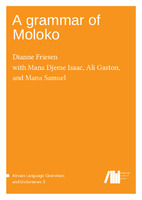A grammar of Moloko
Author(s)
Friesen, Dianne
Collection
Knowledge Unlatched (KU)Language
EnglishAbstract
"This grammar provides the first comprehensive grammatical description of Moloko, a Chadic language spoken by about 10,000 speakers in northern Cameroon. The grammar was developed from hours and years that the authors spent at friends’ houses hearing and recording stories, hours spent listening to the tapes and transcribing the stories, then translating them and studying the language through them. Time was spent together and with others speaking the language and talking about it, translating resources and talking to Moloko people about them. Grammar and phonology discoveries were made in the office, in the fields while working, and at gatherings. In the process, the four authors have become more and more passionate about the Moloko language and are eager to share their knowledge about it with others. Intriguing phonological aspects of Moloko include the fact that words have a consonantal skeleton and only one underlying vowel (but with ten phonetic variants). The simplicity of the vowel system contrasts with the complexity of the verb word, which can include information (in addition to the verbal idea) about subject, direct object (semantic Theme), indirect object (recipient or beneficiary), direction, location, aspect (Imperfective and Perfective), mood (indicative, irrealis, iterative), and Perfect aspect. Some of the fascinating aspects about the grammar of Moloko include transitivity issues, question formation, presupposition, and the absence of simple adjectives as a grammatical class. Most verbs are not inherently transitive or intransitive, but rather the semantics is tied to the number and type of core grammatical relations in a clause. Morphologically, two types of verb pronominals indicate two kinds of direct object; both are found in ditransitive clauses. Noun incorporation of special ‘body-part’ nouns in some verbs adds another grammatical argument and changes the lexical characteristics of the verb. Clauses of zero transitivity can occur in main clauses due to the use of dependent verb forms and ideophones. Question formation is interesting in that the interrogative pronoun is clause-final for most constructions. The clause will sometimes be reconfigured so that the interrogative pronoun can be clause-final. Expectation is a foundational pillar for Moloko grammar. Three types of irrealis mood relate to speaker’s expectation concerning the accomplishment of an event. Clauses are organised around the concept of presupposition, through the use of the na-construction. Known or expected elements are marked with the na particle. There are no simple adjectives in Moloko; all adjectives are derived from nouns. The authors invite others to further explore the intricacies of the phonology and grammar of this intriguing language."
Keywords
chadic languages; orthern cameroon; grammar; Clitic; Labialization; Moloko; Noun phrase; Object (grammar); Pronoun; Prosody (linguistics); Verb; Word stemDOI
10.5281/zenodo.824016ISBN
9783946234623;9783961100101OCN
1030816292Publisher
Language Science PressPublisher website
https://langsci-press.org/Publication date and place
2017Grantor
Series
African Language Grammars and Dictionaries, 3Classification
Linguistics


 Download
Download Web Shop
Web Shop